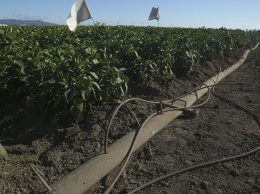Water shortage spurs string of tri-county drought dilemmas
IN THIS ARTICLE
- Agribusiness Topic
- Marissa Wenzke Author
By Marissa Wenzke Friday, January 30th, 2015
The emergency drought of 2014 and persistently dry conditions since then have made for difficulties in almost every industry, as the state has grappled with a way to resolve the issue of quickly depleting groundwater.
So far the Sustainable Groundwater Management Act, which officially took effect Jan. 1, has been the answer; but the groundwater management agencies the law intends to form, as well as the rules and regulations for them to abide by, will take a few years to establish. In lieu of a quick solution and the inability for water to stop being essential to life, the state has taken other steps.
On Jan. 23, the state awarded $2 million to the Lake Cachuma pumping project, which provides drinking water to 220,000 South Coast residents. State Senator Hannah-Beth Jackson and Assemblymember Das Williams were on hand to present the funding during a conference at the Cachuma Operation and Maintenance Board offices in Santa Barbara.
Funding was provided by the Department of Water Resources and State Water Resources Control Board, and the lake — which is currently at 28 percent capacity — provides water to the cities of Carpinteria, Goleta, Santa Barbara and Montecito.
Montecito’s suspicions
The Santa Barbara County Grand Jury recently ruled that Montecito residents are paying what they should be for water, overturning the claim that customers of the Montecito Water District could be overpaying for their water usage.
The jury found that the water district’s billing statements were confusing, as they failed to distinguish between water for residential use and for agricultural use.
“For water customers who used both agricultural and residential allocations, the resulting water bills did not segregate the two allocations,” a jury statement explains. “This led users to believe they were not getting any water for residential use, yet were being charged for it.”
Meanwhile, Montecito residents are tied up in another water dilemma with the filing of a lawsuit against Goleta-based Slippery Rock Ranch.
The 725-acre avocado farm has said that it has access to a groundwater basin below its property that could hold as much as water as Lake Cachuma. When talks arose of the ranch drilling up and selling the water to nearby cities, Montecito took interest but Goleta declined and has now taken legal action against the ranch.
The city of Goleta filed the lawsuit two days after a delegate from the Montecito water District pleaded with board members to allow Slippery Rock to go forth with its water-selling plans, even offering to spend $500,000 to get the 500 to 1,000 acre feet of water that Montecito is seeking, according to a report from the Santa Barbara Independent.
Last year the district spent $1.4 million buying supplemental water supplies from agencies in Santa Ynez, Vandenberg Air Force Base and the Central Valley.
Harvard buys thirsty Paso land
Brodiaea Inc., owned by the $36 billion endowment fund for Harvard University, has spent $60 million on roughly 10,000 acres of farmland in Santa Barbara and San Luis Obispo counties since 2012.
With the purchases, Harvard University has become one of the Top 20 growers in the Paso Robles region. Reuters reported that Harvard purchased water well drilling permits for its California vineyards just days before new pumping in the area was banned by local officials.
Simi firm settles
Waste Management G.I. Industries in Simi Valley has reached a settlement with the Ventura-based nonprofit Wishtoyo Foundation and its stormwater protection agency, the Ventura Coastkeeper Program.
WM G.I. Industries has been ordered to implement pollution prevention and control measures that would protect water quality in the nearby area, in addition to paying $40,000 to the Central Coast Alliance United for a Sustainable Economy, or CAUSE, to conduct at least 25 community clean-up programs.
The lawsuit was first filed in March 2014, when the Wishtoyo Foundation alleged that the Simi Valley firm was violating its general industrial stormwater permit by reporting too high of pollution levels. The suit was filed in federal court under the Clean Water Act but was later dismissed and replaced with a settlement agreement.
“The settlement not only protects Ventura County’s coastal waters, Mugu Lagoon, and Arroyo Simi from discharges of toxic metals, trash and E. coli from the G.I. Industries Facility, but from other industrial facilities that otherwise may be ignoring the law to the detriment of our current and future generations,” said Wishtoyo General Counsel and Water Initiative Director Jason Weiner in a press release.
Related Articles
Our View: California braces for another dry summer
 Thursday, June 24th, 2021
Thursday, June 24th, 2021









